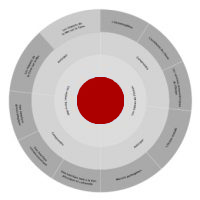Nature-centric/ THE OCEAN : A GLOBAL CHALLENGE AND A PLANETARY SOLUTION
The ocean is a complex, interdependent environment with mechanisms and operations that are still poorly understood. Understanding this oceanic system, its functioning, its links with the climate, and its ecosystem services should be the basis for human actions in protecting and enhancing ocean resources for sustainable development.
The ocean’s immensity and inhospitality are behind the lack of knowledge we have of it. Its fauna, flora, geophysical and chemical mechanisms remain largely unknown. Although a component of planet Earth, the ocean can be viewed as a planet in its own right: everything about it is different. From breathing to breeding, from communication to propulsion, its inhabitants and ecosystems are as foreign as those of Jupiter or lo.
The point here is to view the ocean as a new world to be explored, a highly interdependent, complex and difficult environment to study. It would take mankind centuries, at the current rate of oceanographic* knowledge accumulation, to master the subject. Yet humanity is running out of time.
On September 25, 2019, the Intergovernmental Panel on Climate Change released a report entitled ‘’The Ocean and cryosphere* in the Context of Climate Change1’’. 18 The report’s findings are clear: sea levels are rising at an ever-increasing rate and increased absorption of CO2 by oceans has brought about acidification, and this is gathering pace. This, combined with the warming and deoxygenation of waters, is wreaking havoc on ocean systems and marine biodiversity. Impacts are not limited to immediate environments and alarmingly contribute to global warming. To properly understand these issues, we must first understand:
- the workings of the global ocean’s main components,
- the links between the global ocean and climate, and the ocean’s role in climate regulation,
- the nature and importance of ocean ecosystem services.
It is only based on this systemic vision that future perspectives can make more sense. Anticipating developments require a detailed assessment of the current situation and better knowledge of both the factors of degradation and those likely to alter things, so-called game-changers. This knowledge is the only way to better assess the magnitude of the impact of ongoing transformations.

